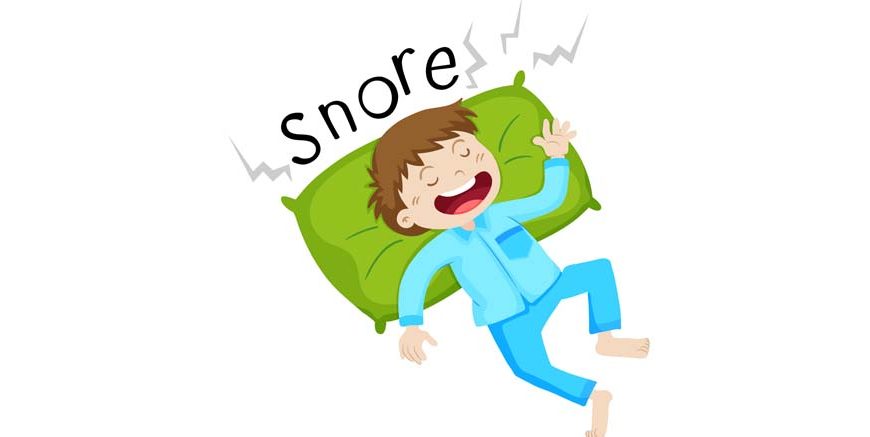Childhood can be a rough time for both children and parents. It is rightly so for kids as they grow up and discover new things in the world as they embark on life’s journey. On the other hand, when it comes to parenthood, parents and caregivers are always under constant worry and pressure to ensure that their kids are always safe. It is not uncommon that childhood is a phase categorized by occasional falls, injuries and even mild sickness. While parents are even aware of this. They still worry as they want the best for their kids. On our blog, we’ve covered various issues on child healthcare and nutrition and the topic of discussion today in our article revolves around snoring in children and what it signifies. As adults, we often overlook small health concerns like snoring at night and write it off as something which naturally happens. However, this may not be so true in all cases. Before we dig deeper into what causes snoring, let’s have a look at what is meant by snoring.
What Is Snoring?
While this seems to be an almost everyday thing, we often never really look into what snoring is. To put it simply, snoring is the sound produced when there is a blockage or some kind of obstruction in the airway that is located in the back of the mouth and nose. When this airway becomes partially blocked due to different reasons, the air is exhaled through a smaller passage, creating the sound of snoring. While occasional snoring in kids can be overlooked, the real problem arises when the snoring is persistent and continuous. Snoring in kids can be grouped into two simple categories, primary snoring and Obstructive Sleep Apnea (OBS).
- Primary snoring
- Obstructive Sleep Apnea (OBS)
This kind of snoring isn’t dangerous and usually occurs without hampering breathing or the inhalation and exhalation process. It is medically classified as benign and could be linked to simple causes like poor sleeping posture, congestion in the nasal cavity, or even colds and allergies. This kind of snoring usually ends once the temporary illness also ceases to exist.
Snoring resulting from OBS is where it becomes a little worrisome. This is mainly because it hampers the breathing process and causes continuous pauses while breathing. When suffering from OBS, kids can wake up suddenly in the middle of the night feeling breathless, will have trouble going to sleep and will also be more fatigued during the day. One of the main reasons for the fatigue is because of the pauses in the breathing cycle which ultimately leads to a restless sleep.
Now that you have an understanding of what is meant by snoring, it’s time to delve into what causes snoring or why people snore.
What Causes Snoring?
- Tonsillitis
- Congestion and allergies
- Obesity
- Abnormalities in body structure
- Sleeping posture
- Genes
One of the major reasons for snoring in kids is tonsillitis and adenoids. These sensitive tissues are located at the back of the throat. They are prone to various infections and become inflamed. When they do, they enlarge and obstruct the passageway of air at the back of the mouth which leads to snoring.
Almost all kids are prone to nasal congestion and allergies, especially during the change of seasons. The constant back and forth of temperature fluctuation leads to cold and the rise and spread of viral infections. Dust allergies and sinuses are some of the most common causes of snoring in kids.
Believe it or not being overweight may cause snoring in kids. This is because of an accumulation of soft tissue around the neck and back of the throat, making it difficult for the air to pass through. This is one of the primary reasons why kids and adults who suffer from weight problems are always recommended to sleep on their side rather than their backs.
This is mainly confined to structural abnormalities in the mouth, nose or jaw. For instance, a deviated septum or a narrow airway can lead to snoring and other sleep disorders in children.
Did you know that how you lie down and sleep could be contributing to snoring? Lying flat on your back while sleeping causes the soft tissue and tongue to fall backwards, obstructing the airway and causing one to snore. This position should be avoided if you first discover that your child has begun snoring.
There are some things which you just can’t escape. If you have a family history of snoring and a background of sleep apnea, there’s a high risk of you developing it. Parents suffering from sleep apnea often pass it on to their children and the circle continues.
Signs Of Snoring In Kids That Indicate Bigger Problems
If your child’s snoring continues and gets worse, it’s time to seek medical help from a qualified professional. It’s important to keep your pediatrician up to date regarding your child’s snoring. There are a few signs and symptoms to look out for that could help you discover the root cause of the matter. Oftentimes snoring can be an effect of a more serious problem and the only way to get rid of the snoring is by treating the problem. Signs of kids gasping for breath, blushing skin, morning fatigue, difficulty concentrating and learning, obesity, and slow weight gain are a few symptoms that could signify bigger health problems.
How To Treat Snoring?
The question of how to cure snoring must have come to your mind before. Luckily for you, we have a few suggestions to treat snoring and some may likely even help your kid.
- Lifestyle change
- Using nasal decongestants
- Continuous Positive Airway Pressure (CPAC)
- Surgery
Cultivating good eating and sleeping habits can do a world of wonders to your life. Have a routine and follow it religiously to avoid health problems.
This is usually administered to those suffering from congestions or sinuses in the form of drops or a spray and is used to alleviate the blockage in the air passage. It is commonly used before sleeping to ensure a restful sleep.
This is a kind of therapy that aims to deliver a continuous flow of air while sleeping. Patients going through this treatment are required to wear a mask that is hooked up to a machine. It is commonly used to treat sleep apnea in children.
These are mainly done to correct birth abnormalities that affect the airway passage in the back of the mouth. They are corrective surgeries that include the removal of tonsils, reconstructing a mouth or jaw, or even treating a deviated septum.
Here at EuroKids, we strive to bring to you and your kids not just the best on the academics front, but also informative news on raising kids and child healthcare. Our team of experts and professionals work tirelessly to ensure that your little ones grow up to be respectable, educated and healthy citizens of the country. Our pride lies in their achievements. Our blog is a treasure trove when it comes to enriching articles on childhood and parenthood. If you want to learn more, visit us at our blog or our nearest center to you.

















